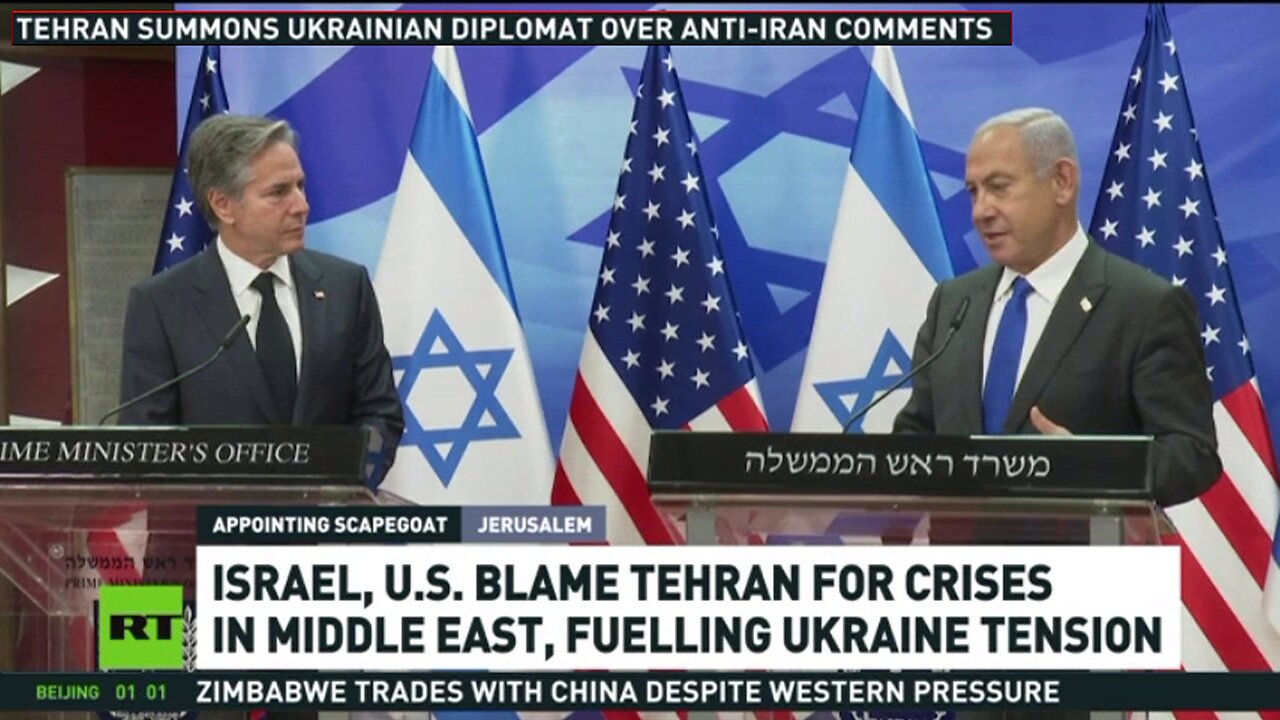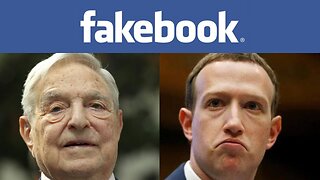Premium Only Content

RT News - January 30th 2023 Late
Athony Blinken, US Sec of State was in Israel today visiting Benjamin Netanyahu. Both seemed to blame Iran but neither of them said what they were blaming Iran for.
In the wake of a drone attack, Tehran reportedly summons a Ukrainian diplomat for questioning, after Ukraine's Presidential adviser says an attack on Iran would be expected amid claims it's supporting Russia's military. https://twitter.com/Podolyak_M/status/1619647615016251392
Iran and Saudi Arabia are to resume informal relations as they are both to visit Iraq for talks. This could be formalised at a time to come if U.S.A. is stopped from pressuring Saudi.
Pakistan's foreign Minister says co-operation between Islamabad and Moscow will include new plans for an oil pipeline, as the country faces severe energy shortages. Business may be done is local currencies. Multipolar world.
On the hunt for Lithium, the German chancellor tours South America - a strategic material that China is also seeking. Report from Rachel Marsden.
Pres. Erdogan says France only has itself to blame for it's fading influence and credibility in Africa. Yusef Erim reports.
Croatia's President Zoran Milanovic says the EU has no exit ramp and is prolonging the conflict in Ukraine.
Anna Fotyga, Polish Member of the European Parliament and the former Minister of Foreign Affairs of Poland has said she wants Russia to be dismantled and has called Russia a terrorist organisation https://www.euractiv.com/section/politics/opinion/the-dissolution-of-the-russian-federation-is-a-far-less-dangerous-than-leaving-it-ruled-by-criminals/ (QS: I am genuinely shocked an MEP or any other official is allowed to write such things in Euractiv and query the nature of that outlet for letting it be published)
China says the U.S. initiated the conflict in Ukraine and must stop sending weapons. Washington has claimed that China is sending Russia weapons (to use in the conflict). Report from Qinduo Xu.
================================================
Below via RT website
-
1) --- Johnson lied about Putin missile ‘threat’ – Kremlin
2) --- Putin talks cooperation with US ally
3) --- Young UK adults worry they won't' afford family – survey
4) --- Ukraine begins jailing draft dodgers – MP
5) --- Polish economy slows as Ukraine conflict drags on
6) --- Glenn Diesen: Is NATO helping Ukraine to fight Russia or is it using Ukraine to fight Russia?
7) --- Berlin has abandoned its post-Hitler pacifism, the 'German question' has returned
8) --- Poland sets condition on potential F-16 deliveries to Ukraine
==================================================
30 Jan, 2023 12:48
1) --- Johnson lied about Putin missile ‘threat’ – Kremlin
The former British prime minister claimed the Russian president had made the comments in a telephone call last February
Allegations that Russian President Vladimir Putin threatened then-UK Prime Minister Boris Johnson with a missile strike are “a lie,” Kremlin press secretary Dmitry Peskov said on Monday. Johnson’s accusations have emerged in a new BBC documentary about the crisis in Ukraine.
Recalling a telephone call with Putin on February 2, 2022, just over three weeks before tensions over Ukraine escalated into full military action, Johnson claimed the Russian leader “threatened me at one point.”
“He said, ‘Boris, I don’t want to hurt you but, with a missile, it would only take a minute’ or something like that… jolly,” the former PM told the British broadcaster.
“There were no missile threats,” Peskov told reporters on Monday. “When he explained challenges to the security of the Russian Federation, President Putin remarked that if Ukraine joins NATO, the potential deployment of NATO or American missiles at our borders would mean that any missile could reach Moscow in mere minutes.”
The Russian official wondered if Johnson had lied deliberately or “simply didn’t understand what President Putin was talking about.” If the latter is true, people should be concerned for Johnson, Peskov added.
(QS - Johnson is very prone to telling lies. So many he forgets which ones and why, he also forgets that all calls made to Russia (and other countries heads of state) are recorded and kept forever)
https://www.rt.com/russia/570690-putin-johnson-missile-threat/
=================================================
30 Jan, 2023 17:21
2) --- Putin talks cooperation with US ally
The Russian president spoke with the Saudi crown prince, discussing OPEC Plus
Putin has publicly voiced Russian concerns over NATO infrastructure in Ukraine and other parts of Eastern Europe for decades. Russia began military operations against Ukraine after failing to get security guarantees from Washington, which would have rolled back the deployment of NATO assets in Eastern Europe and suspended its expansion in the region. The US dismissed Moscow’s concerns and claimed that Ukraine was free to seek membership as a sovereign nation.
Russian President Vladimir Putin and Saudi Crown Prince Mohammed bin Salman have discussed bilateral cooperation and measures to stabilize the global oil market in a phone call, the Kremlin stated on Monday.
“Issues of further development of bilateral cooperation in the political, trade, economic and energy fields” were discussed, according to the Kremlin. Furthermore, the two leaders spoke of “cooperation within the framework of OPEC Plus to ensure the stability of the world oil market.”
Pres. Putin and Prince Mohammed have spoken several times since Russia launched its military operation in Ukraine last February, with these calls taking place amid a growing rift between Saudi Arabia and the US, the Kingdom’s closest international partner.
Over the last year, Riyadh has deepened its ties with Beijing and declared its readiness to trade oil for Chinese yuan, a move that would threaten the US dollar’s standing as the world’s dominant petrocurrency.
As the de-facto leader of the Organization of Petroleum Exporting Countries (OPEC), Saudi Arabia further snubbed the US last July when it refused to increase oil production following a meeting between Prince Mohammed and US President Joe Biden. An increase would have simultaneously benefited Biden by lowering gas prices in the US ahead of November’s midterm elections, and weakened the Russian economy by reducing its oil revenue.
Instead, OPEC and its allies (a group of nations including Russia that make up the ‘Plus’ in the organization’s title) agreed in October to cut production by two million barrels per day, a move that kept prices steady for the benefit of producers.
With Moscow and Riyadh both interested in maintaining their petroleum profits, the US-backed price cap on Russian oil is viewed in both capitals as a potential threat to revenue. Furthermore, OPEC’s members worry that the measure could become “a global price cap” in the future, potentially ruining their economies.
Washington responded to Saudi Arabia’s refusal to boost production by threatening to re-evaluate its relationship with Riyadh “in a very deliberate fashion.” Democratic lawmakers pressed Biden to halt arms sales to the Kingdom unless it would reverse OPEC’s production cut, accusing the Saudis of “colluding” with Russia.
https://www.rt.com/russia/570713-putin-saudi-phone-call/
============================================
30 Jan, 2023 17:28
3) --- Young UK adults worry they won't' afford family – survey
Individuals aged 16-25 are more unhappy and less confident than at any point since the Prince’s Trust began measuring
Nearly half (45%) of young adults aged 16 to 25 in the UK fear they will never make enough money to support a family, according to a report from the Prince’s Trust charity published Monday. The figure increases to 53% among young people from more modest backgrounds.
Their concern seems to have affected long-term planning, with only 36% of respondents telling the charity their biggest goal was having a family. Much more popular, with 64% of the responses, was achieving financial security. Another 43% picked good mental health as their primary goal.
As for how to achieve that goal, 70% of respondents said having a job that provides financial stability was good for their mental health, and 59% said merely being employed no matter the salary improved their mental state.
The biggest worry for the age group, named by 57% of respondents, was the cost-of-living crisis. Another 34% cited the looming recession – predicted by a growing majority of economic experts worldwide – as their chief concern.
General happiness and confidence among this age group were at lower levels than any time since the Trust began polling amid the financial crisis of 2008. While 70% of young people said they are “determined to achieve their goals in life,” 36% of low-income respondents expressed worry they were going to “fail in life,” and almost half (46%) said economic uncertainty made them feel “hopeless” about the future. That number climbed to 55% among low-income youth.
Mental health issues have become the norm, with 45% reporting having experienced a mental health problem at some point. Some 56% reported being anxious most or all of the time and 62% said they were always or often stressed.
UK Chief Executive of the Prince’s Trust, Jonathan Townsend, described the survey results as “a warning sign that, post pandemic, young people’s wellbeing has not recovered.” Referring to the age group as the “Class of Covid,” he remarked that “economic uncertainty is having a profound impact on their wellbeing and confidence in achieving their aspirations for the future.”
https://www.rt.com/news/570709-uk-youth-worry-financial-future/
==================================================
30 Jan, 2023 18:11
4) --- Ukraine begins jailing draft dodgers – MP
Evading mobilization during “wartime” is punishable by up to five years behind bars
Ukraine’s judiciary has begun jailing draft dodgers, MP Alexander Dubinsky said on Monday, citing court papers.
The politician shared a link to a ruling issued by a court in Ukraine’s northeastern region of Sumy, which sentenced an unidentified person to three years behind bars for failing to respond to the ongoing military call-up amid the conflict with Russia. The MP said the case was particularly concerning given the court’s approach to the proceedings and the defendant’s testimony about his medical examination.
The defendant, who pleaded not guilty, claimed that the examination by the military was a mere formality, and that the doctors had pronounced him healthy without actually examining him. The would-be recruit, however, insisted he was not fit for service, citing acute periarthritis in his knee.
Nevertheless, the court found the man guilty of “evading mobilization during wartime” and sentenced him to three years behind bars. Draft evasion under Ukrainian law carries a maximum penalty of five years in jail, as well as massive fines.
Since the beginning of the conflict between Russia and Ukraine, nearly 2,500 criminal cases over draft dodging have been opened, according to local media reports. While some 1,300 of the cases have been dismissed, more than 400 indictments have already made it to the courts.
In recent weeks, Ukrainian authorities have intensified their forced mobilization efforts in an apparent attempt to compensate for heavy frontline losses. Numerous videos circulating online show Ukrainian military officials chasing military-age citizens in the streets and even forcibly detaining them at gunpoint. In some locations military officials have reportedly resorted to various unexpected measures, such as hiding in ambulances to surprise unsuspecting ‘recruits’ or handing out draft summons at bomb shelters during air-raid alarms.
Russia sent troops into Ukraine on February 24, 2022, citing Kiev’s failure to implement the Minsk agreements, which were designed to give Donetsk and Lugansk special status within the Ukrainian state. The protocols, brokered by Germany and France, were first signed in 2014. Former Ukrainian President Pyotr Poroshenko has since admitted that Kiev’s main goal was to use the agreement to buy time and “create powerful armed forces.”
The Kremlin recognized the Donbass republics as independent states and demanded that Ukraine officially declare itself a neutral country that will never join any Western military alliance. Kiev insists the Russian offensive was completely unprovoked.
https://www.rt.com/russia/570694-ukraine-draft-dodgers-jailed/
=================================================
30 Jan, 2023 15:16
5) --- Polish economy slows as Ukraine conflict drags on
The country’s GDP growth decelerated to 4.9% in 2022, official statistics show
Poland’s GDP growth in 2022 slipped from the previous year amid soaring inflation and a plunge in consumer spending brought about by the conflict in neighboring Ukraine and the impact of anti-Russia sanctions, according to data from the country’s statistics agency.
A flash estimate released on Monday shows the country’s GDP having grown by 4.9% in 2022, down from the 6.8% recorded in 2021. The growth was driven largely by industrial production, the rebuilding of inventories, exports, and investment. Consumption, however, registered a strong slowdown going into the end of the year, as inflation weighed on real disposable income and spending.
“This very good result is to a large extent the effect of a very good first half of the year. The second half of the year brought a clear slowdown in economic activity, because the effects of higher inflation and higher interest rates became apparent,” Grzegorz Maliszewski, chief economist at Bank Millennium, told Reuters.
December saw headline inflation slow to 16.6% year-on-year thanks to energy prices coming down from the nearly 25-year highs they reached earlier in the year. However, analysts warn that consumer prices may surge again in February 2023, as core inflation continued to rise in December, to 11.6% from 11.4% in November.
Analysts expect the beginning of 2023 to be difficult for the Polish economy, but predict that the second half of the year may bring an upturn.
“Unless Europe encounters problems securing energy sources for next winter season (2023/24), we expect economic growth of about 1% this year. This should be accompanied by… persistently high core inflation, which will not allow interest rate cuts before the end of this year,” analysts from ING said in a report.
The governor of Poland’s central bank, Adam Glapinski, said earlier this month that he expects the country to avoid a recession, although there may be temporary fluctuations in the first quarter of the year. He forecast GDP growth to come in at around 0.7% in 2023, “but still positive.”
https://www.rt.com/business/570685-poland-economy-slows-ukraine/
=============================================
30 Jan, 2023 12:02
6) --- Glenn Diesen: Is NATO helping Ukraine to fight Russia or is it using Ukraine to fight Russia?
The bloc could help end the conflict, at any time, by addressing the issues around its plans for further expansion
(By Glenn Diesen, Professor at the University of South-Eastern Norway and an editor at the Russia in Global Affairs journal.)
The Western public, like others, are justly appalled by the human suffering and the horrors of the Ukrainian war. Empathy is one of the great virtues of humanity, which in this instance translates into the demand for helping Ukrainians. Yet, propaganda commonly weaponizes the best in human nature, such as compassion, to bring out the worst. As sympathy and the desire to assist the displaced are used to mobilize public support for confrontation and war with Russia, it is necessary to ask if the Western public and Ukrainians are being manipulated to support a proxy war.
Is NATO helping Ukraine to fight Russia or is NATO using Ukraine to fight Russia?
The organization as a passive actor?
The US-led military bloc commonly depicts itself as an innocent third party that merely responds to the overwhelming desire of the Ukrainian people to join its ranks. Yet, for years NATO has attempted to absorb a reluctant Ukraine into its orbit. A NATO publication from 2011 acknowledged that “The greatest challenge for Ukrainian-NATO relations lies in the perception of NATO among the Ukrainian people. NATO membership is not widely supported in the country, with some polls suggesting that popular support for it at is less than 20%”.
In 2014, this problem was resolved by supporting what Statfor’s George Friedman labelled “the most blatant coup in history” as there were no efforts to conceal Western meddling. Regime change was justified as helping Ukrainians with their “democratic revolution”. Yet, it involved the unconstitutional removal of the elected government as a result of an uprising that even the BBC acknowledged did not have majority support amongst the general public. The authorities elected by the Ukrainian people were replaced by individuals handpicked by Washington. An infamous leaked phone call between State Department apparatchik Victoria Nuland and Ambassador Geoffrey Pyatt revealed that Washington had chosen exactly who would be in the new government several weeks before they had even removed president Yanukovich from power.
Donbass predictably rejected and resisted the legitimacy of the new regime in Kiev with the support of Russia. Instead of calling for a “unity government”, a plan for which Western European states had signed as guarantors, NATO countries quietly supported an “anti-terrorist operation” against eastern Ukrainians, resulting in at least 14,000 deaths.
The Minsk-2 peace agreement of February 2015 produced a path for peace, yet the US and UK sabotaged it for the next 7 years. Furthermore, Germany’s Angela Merkel and France’s Francois Hollande recently admitted that both Germany and France considered the deal an opportunity to buy time for Ukraine to arm itself and prepare for war.
In the 2019 election, millions of Ukrainians were disenfranchised, including those living in Russia. Nevertheless, the result was a landslide with 73% of Ukrainians voting for Vladimir Zelensky’s peace platform based on implementing the Minsk-2 agreement, negotiating with Donbass, protecting the Russian language, and restoring peace with Moscow. However, the far-right militias that were armed and trained by the US effectively laid down a veto by threatening Zelensky and defying him on the front line when he demanded to pull back heavy weapons. Pressured also by the US, Zelensky eventually reversed the entire peace platform the Ukrainians had voted for. Instead, opposition media and political parties were purged, and the main opposition leader, Viktor Medvedchuk was arrested. Subverting the wishes of Ukrainians in order to steer the country towards confrontation with Russia was yet again referred to as “helping” Ukraine.
Towards proxy war
In 2019, the Rand Corporation published a 325-page report ordered by the US Army titled “Extending Russia: Competing from Advantageous Ground”. In the language of a proxy war, the report advocated arming Ukraine to bleed Moscow stating, “Providing more U.S. military equipment and advice could lead Russia to increase its direct involvement in the conflict and the price it pays for it”. The US Chair of the House Intelligence Committee, Adam Schiff, similarly explained in 2020 the strategy of arming Ukraine claiming, “The United States aids Ukraine and her people so that we can fight Russia over there and we don't have to fight Russia here”.
In December 2021, the former head of Russia analysis at the CIA warned that the Kremlin was under growing pressure to invade to prevent Washington from further building up its military presence on its borders, which included modernising Ukrainian ports to fit US warships. “That relationship [US-Ukraine] will be far stronger and deeper, and the United States military will be more firmly entrenched inside Ukraine two to three years from now. So inaction on [the Kremlin’s] part is risky," George Beebe explained. Yet, despite being convinced that Russia would invade, Washington refused to give any reasonable security guarantees to Moscow.
Kiev agreed to enter into negotiations merely three days into the Russian invasion, which resulted in a peace agreement outline a few weeks later. Former intelligence official Fiona Hill and Angela Stent later penned an article acknowledging that “Russian and Ukrainian negotiators appeared to have tentatively agreed on the outlines of a negotiated interim settlement: Russia would withdraw to its position on February 23, when it controlled part of the Donbass region and all of Crimea, and in exchange, Ukraine would promise not to seek NATO membership and instead receive security guarantees from a number of countries”.
However, after a visit by UK Prime Minister Boris Johnson, Kiev suddenly withdrew from the peace negotiations. Reports in the Ukrainian and American media have suggested that London and Washington had pressured Kiev to abandon negotiations and instead seek victory on the battlefield with NATO weapons.
Johnson gave multiple speeches warning against a “bad peace," while German General Harald Kujat, a former chairman of the NATO Military Committee, confirmed that Johnson had sabotaged the peace negotiations in order to fight a proxy war with Russia: “His reasoning was that the West was not ready for an end to the war”.
The American objectives also had seemingly little to do with “helping” Ukraine. US Secretary of Defense Lloyd Austin stated US goals in Ukraine as the weakening of a strategic rival: “We want to see Russia weakened to the degree that it can't do the kinds of things that it has done in invading Ukraine”. PresidentBiden argued for regime change in Moscow as Putin “cannot remain in power”, which was repeated by Boris Johnson’s op-ed stating that “The war in Ukraine can end only with Vladimir Putin’s defeat”.
US Congressman Dan Crenshaw advocated for a proxy war by supplying weapons to Ukraine as “investing in the destruction of our adversary’s military, without losing a single American troop, strikes me as a good idea”. Similarly, Senator Lindsey Graham argued the US should fight Russia to the last Ukrainian: “I like the structural path we’re on here. As long as we help Ukraine with the weapons they need and the economic support, they will fight to the last person”. The rhetoric is eerily similar to that of Hungarian billionaire George Soros, who argued that NATO could dominate if it could use Eastern European soldiers as they accept more deaths than their Western peers: “the combination of manpower from Eastern Europe with the technical capabilities of NATO would greatly enhance the military potential of the Partnership because it would reduce the risk of body bags for NATO countries, which is the main constraint on their willingness to act”.
Following NATO Secretary General Jens Stoltenberg’s recent Orwellian statement that “weapons are the way to peace”, it is worth assessing if NATO is helping Ukraine or using Ukraine. NATO powers have stated that they are supplying Ukraine with weapons to have a stronger position at the negotiating table, yet one year into the war, no major Western leaders have called for peace talks. NATO has a powerful bargaining chip that would actually help Ukraine, which would be an agreement to end NATO expansion toward Russian borders. However, whitewashing the bloc’s direct contribution to the war prevents a negotiated settlement.
https://www.rt.com/news/570687-nato-ukraine-fight-russia/
===============================================
30 Jan, 2023 15:15
7) --- Berlin has abandoned its post-Hitler pacifism, the 'German question' has returned
The remilitarization of its second most-populous country has profound consequences for Europe
(By Fyodor Lukyanov, the editor-in-chief of Russia in Global Affairs, chairman of the Presidium of the Council on Foreign and Defense Policy, and research director of the Valdai International Discussion Club.)
After a period of playing hard to get, the German government has agreed to supply Ukraine with Leopard tanks - its own and those in service with other NATO countries. We will leave it to military experts to assess how this will affect Ukraine's combat capabilities and the course of operations. The question for us is what does it mean in political terms?
Germany and military power - the combination of these terms has made many Europeans uncomfortable for at least a century and a half.
The "German question", which refers to Berlin’s place and role on the continent, led to major military clashes on more than one occasion before the two world wars. The Second World War seemed to have resolved it by abolishing the unified German state and placing its regions under external control.
This is why the reunification of the country at the turn of the 1990s initially provoked cautious reactions from Bonn’s Western allies, for whom the memory of ambitions for a greater “reich” were still fresh. The irony of history is that it was Soviet Moscow that was the most enthusiastic about reunification.
Interestingly, the roots of the current dangerous crisis in European security can be traced back to this time. The idea of enlarging NATO arose from a context of providing guarantees in the event of German unification. The US, France, Britain, Italy, West Germany and its smaller neighbors believed (not unreasonably) that keeping a reunited country in the US-led military bloc would deter any hypothetical desire to one day go its own way.
Washington, London, Paris and Bonn thought that the Soviet Union would oppose this, but the Kremlin took an unconventional approach and did not object to keeping Germany in NATO. It turned out though that the extension of the bloc's jurisdiction to the territory of the former GDR became a precedent for everything else. After all, the principle of the right of each state to choose its own membership in any association was enshrined in the ideological and legal framework. The path from this to the question of Ukraine's NATO membership was not instantaneous, but it was straightforward.
The pacifism forced onto Germans after the Second World War implied that Germany (first only the West, then the whole) could and should be a model ally within the military bloc, but would not play a leading role. This was the case after the Cold War - the operations in Yugoslavia and Afghanistan in which the Bundeswehr was involved were not initiated by Berlin, and its participation was somewhat reticent.
The “times have changed” position announced by Chancellor Olaf Scholz in February 2022 implied the beginning of a new era, and at the same time major investments in defense modernization were promised. However, against the backdrop of general exaltation, especially Eastern European, Berlin maintained an unhurried pace. Its Allies grumbled, but up to a certain point most of them also tried to act rather cautiously so as not to provoke an escalation. Since the autumn, however, any limitations seem to have been lifted - especially in Washington and London (Warsaw never had any), but also more widely: The goal of defeating Russia militarily has been articulated directly and at all levels.
Here Germany faced a crucial choice, of which the tank plan was a concrete manifestation. Given the prevailing mood in the Western bloc, it was immediately clear that Berlin would not be able to oppose the transfer of the Leopard tanks. The hitch was probably the realization that Germany's decision would qualitatively increase its involvement in the conflict and open the way for a further arms build-up. The next meeting of the contact group in Rammstein has already been named "airborne". The more advanced the equipment sent to Kiev, the more likely it is that its forces will no longer be able to maintain the military hardware.
If we recall the straight line from the conditions of German unification to the preconditions of the current crisis, the conclusion is paradoxical.
33 years ago, NATO was seen as the surest guarantee against a hypothetical resurgence of German belligerence.
However, membership of the bloc is the main reason for Berlin's increasing involvement in a military conflict. From the West's point of view, there is no danger because Germany is not acting on its own initiative and is in line with the general trend. But this is in a theoretical sense.
What about Poland, which is openly hostile to Germany? Not to mention France, where historical identity is largely shaped by the stories of the consequences of German military rearmament? Can we speak of a strong and self-confident unity?
No one dares predict the outcome of the Ukrainian crisis now, there are too many different circumstances. But, its transformative impact on all aspects of European security is undeniable. The immediate participants in the drama will emerge differently, and the deeper the involvement, the more significant the changes. And while the US, as always, has the advantage of physical distance and the ability to pass on most of the costs to its allies, the Moscow-Kiev-Warsaw-Berlin-Paris line is likely to see qualitative changes. And each will have their own strategy.
There are now no survivors from those who laid the foundations of "new Europe," as it was called in the 1990 Charter. It’s fair to say they would have been surprised by the outcome.
https://www.rt.com/news/570704-berlin-has-abandoned-pacifism/
==============================================
30 Jan, 2023 16:02
8) --- Poland sets condition on potential F-16 deliveries to Ukraine
Warsaw says it is prepared to hand over the planes, but only in coordination with NATO
Poland will transfer F-16 fighter jets to Ukraine, but only as part of a coordinated effort with other NATO partners, Prime Minister Mateusz Morawiecki announced at a press conference on Monday.
Morawiecki said Warsaw coordinates all actions pertaining to strengthening Kiev’s defensive capabilities with its NATO partners, primarily with the US, noting the recent decisions to deliver Patriot air defense systems and M1 Abrams and Leopard 2 tanks to Kiev.
“And just as it happened a few months ago with MiG-29 aircraft, any other aircraft assistance will be coordinated, implemented and, possibly, transferred together with other NATO member states. We will act in full coordination here,” Morawiecki said.
The PM’s statement comes after Polish media reported last week that Warsaw had allegedly transferred a number of its MiG-29s to Ukraine in March 2022, disguising them as spare parts – while the US and allies refused to provide Kiev with military aircraft, deeming the move “too escalatory.”
Since Russia launched its military operation in Ukraine in late February last year, Washington has been one of the main suppliers of military aid to Kiev, spending tens of billions of dollars on lethal assistance. However, the US has been hesitant to provide advanced weaponry such as modern warplanes, fearing they could be used to strike Russian territory and ultimately lead to a direct confrontation between Moscow and NATO.
On Saturday, however, it was revealed that a number of US military officials have been “quietly pushing” the Department of Defense to greenlight the delivery of F-16s to Kiev. As reported by Politico, several sources within the Pentagon claim these efforts are now “gaining momentum” after Washington agreed to send tanks and Patriot systems.
Russia has repeatedly warned the West against supplying Ukraine with weapons, arguing that it would only prolong the conflict. Last week, Kremlin Press Secretary Dmitry Peskov stated that the arms deliveries serve as further proof that Western countries are directly involved in the stand-off between Moscow and Kiev.
https://www.rt.com/news/570707-poland-ukraine-f16-jets/
============================================
-
 LIVE
LIVE
Game On!
12 hours agoCollege Football Playoff Round 1 BEST BETS! | Indiana vs Notre Dame Preview
765 watching -
 14:15
14:15
This Bahamian Gyal
18 hours agoDC server REFUSED to serve Donald TRUMP, then THIS happened . . .
3.68K6 -
 13:47
13:47
MichaelBisping
12 hours agoBISPING Reacts: "Tyson Fury will RETIRE and F&$K UP USYK?!" | Usyk vs Fury 2
2.92K3 -
 14:15
14:15
Tactical Advisor
12 hours agoNew Ruger Glock Clone | Magpul RXM (FIRST LOOK)
63.1K22 -
 7:55
7:55
The Nima Yamini Show
19 hours agoWho Is Controlling Facebook and Instagram? The Truth About George Soros and Meta’s Oversight Board
53.6K74 -
 3:45
3:45
BIG NEM
11 hours agoDiscover Your Ikigai: Finding Your Ultimate Purpose
29.7K1 -
 13:19
13:19
Dermatologist Dr. Dustin Portela
1 day ago $7.32 earnedDo You Have Sebaceous Filaments or Blackheads?
23.3K3 -
 2:21:35
2:21:35
Price of Reason
15 hours agoThe Establishment WORRIES about Elon Musk AGAIN! Superman Trailer Discussion! Sonic 3 Review!
52.8K3 -
 1:14:54
1:14:54
Steve-O's Wild Ride! Podcast
18 hours ago $25.81 earnedZac Brown Reveals The Secrets To HIs Success - Wild Ride #247
102K15 -
 4:16:43
4:16:43
JdaDelete
12 hours ago $14.97 earnedProject Zomboid with the Boys | The Great Boner Jam of 2025
62.3K